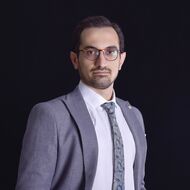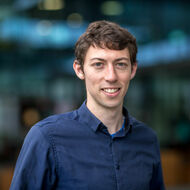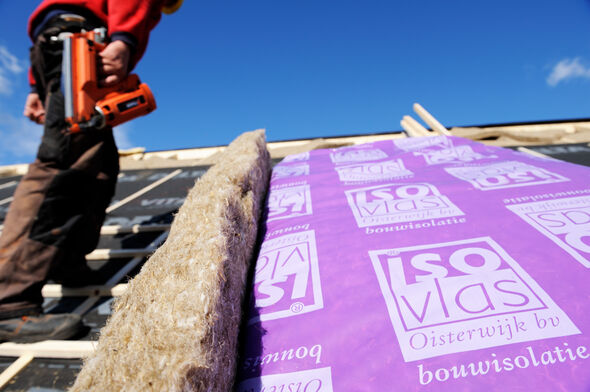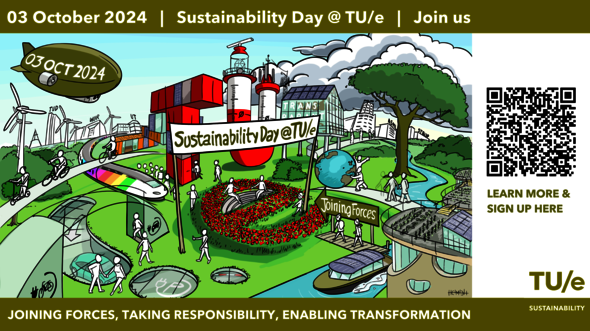
How TU/e makes education more sustainable
New education award should accelerate progress
During Sustainability Day on Oct. 3, the Sustainability in Education Award will be presented for the first time. There are 53 submissions by twenty teachers (collectives) eligible and the winner will receive 2,500 euros. Florent Gauvin (BE), Lorenzo Ceccarelli (EE) and Mehrdad Mohammadi (IE&IS) have applied themselves and tell us what makes their teaching so sustainable.
But first: why is a Sustainability in Education Award needed? “There needs to be a reward system to recognize departments and teacher(groups) who invest in their own teaching and integrate sustainability into the lectures. In fact, most higher education awards are focused on research. This is new,” says Tommaso Mondovì, Sustainable Education Development Officer. He is very excited about the 53 entries. “That’s more than expected.”
Teachers Gauvin, Ceccarelli and Mohammadi have several things in common: they work with Challenge-Based Learning (CBL), they actively promote a systemic approach to change and pay attention to cohesion between social, environmental and economic components.
CBL
Lorenzo Ceccarelli, Postdoc in the Electromechanics and Power Electronics research group recently shifted from doing research to investing most of his time in education. “I’m designing new projects or re-designing old ones to fit the challenge-based learning model, which is becoming increasingly popular at TU/e.”
Mehrdad Mohammadi is Assistant Professor in Smart Manufacturing. “We apply sustainability in our teaching through a CBL approach in the Sustainable Supply Chains course for students in the Operations Management and Logistics master’s program at IE&IS Department. As a new design for the course, we partnered with industry professionals and academics to present students with real-world sustainability challenges. We use innovative teaching methods such as flipped classroom models, interactive tools, serious games, group work, and peer-reviewed presentations to engage students actively.”
As a university, synergy with industry is important, but as a free knowledge institution, we cannot be steered by corporate interests nor enabling unethical use of technology.
At Built Environment Assistant Professor Florent Gauvin has societal challenges as red line in his lectures. “Yes, we need to discuss technical and sometimes mundane concepts that must be learned during my courses. But always with the idea that sustainability is important. It means that I will give several options for a given element in a building, or some key figures about their impact.”
Stop greenwashing
Ceccarelli: “I would like to start bringing the sustainability discourse at TU/e beyond the ‘buzz words’ that often get publicized as potential techno-fixes to the issues we face. It is clear that so much of it is just a smoke screen that some industries are using to slow down a necessary transition and keep profitability high by unsustainable means. As a university, synergy with industry is important, but as a free knowledge institution, we cannot be steered by corporate interests nor enabling unethical use of technology. It is a tough conversation to have, especially because of different mindsets within our community, but education is key.”
The Electrical Engineering postdoc tells about his multi-disciplinary project ‘Circular Electronics Challenge’ which focuses on tackling the issue of electric waste or ‘e-waste’. “About 56 million tons of e-waste are generated worldwide every year, mostly by Western countries, and the number is growing fast. About 80% of this waste stream is not recycled and gets discarded in landfills or shipped to Global South countries where it gets disposed illegally, causing huge damage to ecosystems and communities.” Closing the loop and creating circularity for electronic products, is one of the big challenges of our time, and there is a huge potential value in it to unlock, according to Ceccarelli. “It’s also a challenge that brings together a variety of subjects, from circular design to electronics, all the way to process engineering and material science. Students will learn how to address a complex sustainability challenge working in an interdisciplinary team.”
The students learn the concepts of sustainability and then concrete solutions to reduce carbon footprint or raw material consumption.
Gauvin works with sustainable materials. “ A good example of one of my courses is Materials Panorama, an elective for the Mastertrack Building Physics and Services that dives into a new solution to substitute conventional materials with sustainable (and circular) materials. The students first learn the concepts of sustainability and then concrete solutions to reduce carbon footprint or raw material consumption et cetera.”
Mohammadi’s course at IE&IS focuses on Sustainable Supply Chains and addresses various sustainability challenges such as Resource Depletion, Waste Management, Water Scarcity and Quality, Food Security and Sustainable Agriculture, Energy Transition, Oceans and Marine Ecosystems, and Cultural Heritage Preservation. “Students might work on improving waste management practices in a company or developing strategies for sustainable agriculture.”
Mohammadi and his colleague Geert van Kollenburg aim to further enhance the course by increasing industry interaction. “For instance incorporating more guest lectures and possibly field trips to bridge the gap between academic knowledge and practical industry experience. We also plan to enlarge/fit the course to attract more students from other departments since the course does not need any pre-knowledge, and students from different backgrounds are an asset for this course. Sustainability is a continuous movement and year by year; we plan to achieve our goals.”
Prize money
The award will be handed out by the deans Ines Lopez Arteaga (Bachelor College) and Paul Koenraad (Graduate School). The 2500 euros have to be used for further development of study programs. The teachers already know how they will spend any prize money. They would be glad to organize workshops and guest lectures or buy materials for the students to work with.
“Why not organize some excursion with our students to visit some important research center, factory or even field and farms? I’d like to show them what sustainable building materials can already be grown, such as cattail “, says Gauvin. “I’m currently involved in a European project, https://bio-fibre.org/, where we are creating together with 6 other EU universities a curriculum about sustainable materials, which is unique in Europe. It will start this academic year and 4 of our master students are joining the initiative. I hope that this will pave the way to more initiative towards sustainability in many different programs.”
Sustainability Day
“Sustainability needs a radical change”
The symposium at the Sustainability Day is a very special event for TU/e Sustainability Ambassador Anna Wieczorek, she is delivering her inaugural address on that day. She wants the audience to know that even a radical change to sustainability is possible, provided we do it smartly and gradually. She will first discuss how over time we have come to view environmental problems differently and how our response to major societal challenges must change to be effective. Wieczorek ís a member of the Technology, Innovation & Society research group.
Wieczorek: “TU/e sustainability does not depend on LED lighting on our campus, or sorting wastes. These are just some of very many and minor issues to change and will happen.
What is more important is to change thinking about how we live in general and stimulate the debate about what we want to leave to our children when we are gone.”
One of the other speakers at the symposium named Joining Forces for Smart Change is Marjan Minnesma. She is founder of the Urgenda Foundation, which aims to accelerate transitions through concrete innovative projects.








Discussion